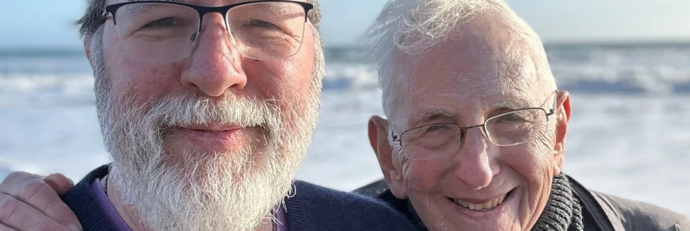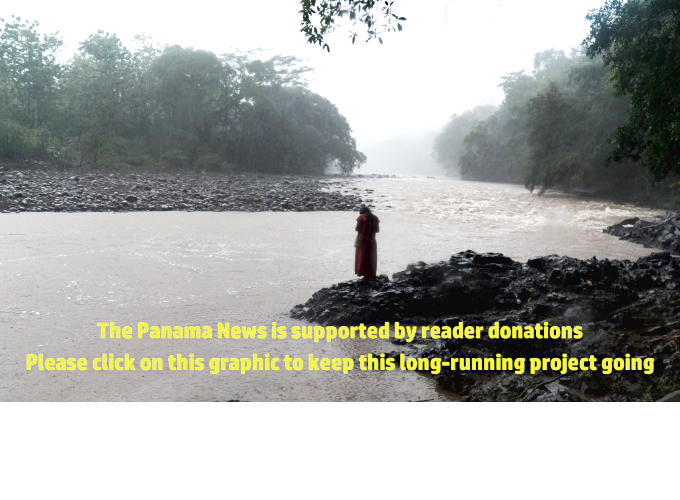In the final days, his joy and gratitude were based on the hope that others would carry on the effort for a better, more peaceful future. I pray that his joy may be justified. A photo of Robert Ellsberg with his father, the whistleblower, author, and anti-nuclear and peace activist Daniel Ellsberg. Photo courtesy of Robert Ellsberg and family.
Eulogy for My Father, Daniel Ellsberg
by Robert Ellsberg — Common Dreams
Peacemaker and whistleblower Daniel Ellsberg died on June 16, 2023, four months after his diagnosis with inoperable pancreatic cancer. In March, he shared news of his prognosis with friends and supporters in the peace movement in a letter posted on Common Dreams. On October 22 his family hosted an online Celebration of Life which featured testimonials by his wife, Patricia, his children, Robert, Mary, and Michael, his grandchildren, and a wide range of friends, fellow peacemakers, and whistleblowers, including Edward Snowden, Jane Fonda, Barbra Streisand, Rev. John Dear, Norman Soloman, Rep. Barbara Lee, Gov. Jerry Brown, Tom Reiffer, Richard Falk, and Randy Kehler. Dan’s son Robert, the Publisher of Orbis Books, delivered this opening eulogy:
During a phone call in February, Dad mentioned—almost as a side note—“If I had a potentially serious condition, would you want to know about it?” I answered with words to the effect: Hell yes! Thus, I learned of a possible mass on his pancreas, which was later confirmed to be pancreatic cancer and was deemed inoperable. He was told he had three to six months to live. He lived for four.
I had known that Dad was never particularly worried or anxious about the prospect of his own death. Since surviving the car accident that killed his mother and sister when he was 15, I think he had always felt he was living on borrowed time. He admitted to me that this probably accounted for his ability to take risks that others might have feared—some of them, arguably reckless, such as driving through the countryside of Vietnam in his Triumph Spitfire. Others, like his willingness to risk life in prison for releasing the Pentagon Papers, served a higher purpose. That lack of fear was one of his superpowers.
[My father] believed that the danger facing humanity came not just from our technology and our policies but from the tragic defect that allowed so many humans not to identify with the sufferings and fate of others far away, not of their tribe.
Yet if the prospect of his own death did not concern him, he spent a lifetime warning against the prospect of mass death hovering over the earth. He stared into the heart of darkness, envisioning a scale of death for which most people have no adequate language or capacity to contemplate. In countless hours in his study, he scratched out thoughts about this danger on one of his yellow legal pads, trying to conceive of words or actions that could arouse humanity to avert the death of our species and the creatures we would take with us.
Compared with that prospect, he accepted his own demise with calm detachment, thus foregoing all the preliminary stages of grief that Elisabeth Kübler Russ famously outlined: denial, grief, bargaining, and depression.
What surprised us was something we would not have predicted: his evident happiness, or what my brother Michael termed “ebullience.”
This was not because he felt any optimism about the state of the world. “I am not generally an optimist,” he told me. “No,” I said, “you are generally a catastrophist.” In fact, he foresaw nothing but sadness and suffering for the future. In light of the dangers posed by the war in Ukraine, he said, “I feel I’m leaving just where I first came in.”
My father was capable of joy and laughter. Often our conversations were a sustained laugh fest. He saw the humor and absurdity in so many things. But none of us had ever witnessed the sustained happiness and enjoyment of life that he showed in the three months following his diagnosis. How to explain what even he acknowledged was a mystery?
I think it came from the sense, as he confided to Patricia, that “a tremendous burden has been lifted from my shoulders.”
He was not alone in his mission, and it gave him great joy to be around those he called his “tribe”—the peacemakers and resisters, the whistleblowers, the fellow prophets like Greta Thunberg—those he said who care about the others.
He had often spoken of his identification with the mythical seer Cassandra: who received the gift of seeing the future, but also the curse that no one would believe her. For most of his life, he had struggled with this dubious gift and the driven sense that he must find some way to make people see and act appropriately. He believed that the danger facing humanity came not just from our technology and our policies but from the tragic defect that allowed so many humans not to identify with the sufferings and fate of others far away, not of their tribe.
He was not alone in his mission, and it gave him great joy to be around those he called his “tribe”—the peacemakers and resisters, the whistleblowers, the fellow prophets like Greta Thunberg—those he said who care about the others. It was that kind of deep empathy that had helped him turn against the war in Vietnam, whose people, he said, “had become as real to me as my own hands.”
And yet the burden of this responsibility definitely dimmed his capacity for sustained happiness—the feeling that somehow the fate of the world depended on him.
I tried at various times, with limited success, to lighten this burden. Using a sports metaphor that I knew was meaningless to him, I once told him that his job was not to get the ball across the goal line—just to move it down the field. Others would carry on.
It was a message he wanted and needed to believe. One time when he was feeling particularly down, I wrote him a letter saying, “Dad, you should never feel you have to do anything—give another interview, spend another night in jail, write another book. You helped end a war. And you set an example of heroic action for peace that will inspire and challenge generations to come. I couldn’t be prouder to be your son.”
After his death I found that message taped to his computer.
I had the great privilege of working with him for two years on his book, The Doomsday Machine. He once told me that he would be happy if his book could prolong the survival of the planet for 43 seconds—the time between the release of the first atomic bomb and its detonation over Hiroshima. “Forgive me,” I told him, “if I hope to aim a little bit higher.”
In his last months, I believe it was given to him to raise his eyes and see a little higher—beyond the doomsday scenarios on his yellow legal pad: to sense that he had done what was given to him to accomplish; the rest was out of his hands. In a letter he sent to friends, he wrote, “I’ve always known that I work better under a deadline. It turns out that I live better under a deadline!”
His horror at the dangers of nuclear war and climate change were fueled by his love for the earth—nature, the ocean, flowers, animals, children, music, poetry, beauty in all is forms, and what it would mean if we were never to see and enjoy these things again.
That letter, which he posted in March, was a great step on his final journey. I believe it will stand as part of his legacy, a message about his own life, about what it means to be a responsible person, and the message of realism and encouragement he hoped to pass along. He described the risk he had undertaken in releasing the Pentagon Papers, and the unexpected results it had achieved, even contributing to the end of the Vietnam War. He was spared a lifetime in prison and allowed to spend the subsequent years attempting to alert the world to the perils of nuclear war. He regretted that his efforts to dismantle the Doomsday Machine had not shown better results. And yet, he wrote, “As I look back on the last sixty years of my life, I think there is no greater cause to which I could have dedicated my efforts.”
He acknowledged and thanked his fellow peacemakers for their efforts. “Your dedication, courage, and determination to act have inspired and sustained my own efforts.” He said he could depart this life knowing that others would carry on.
And he concluded: “My wish for you is that at the end of your days you will feel as much joy and gratitude as I do now.”
His letter evoked an extraordinary response, and I think for the first time he realized how much he was loved. This came as a surprise: yes, people had told him he was admired—but loved?
His message: That you can’t know what you will accomplish, and you may not ever know the results of your actions—but the chance that you can make a difference is worth taking and at the end of the day that is a good way to use your life.
The last time he left the house was for an outing we shared to Stimson Beach, one of his favorite places in the world. It was too cold to dip our toes in the water, but we lay on the sand, surrounded by seagulls and the sound of the surf. It reminded me that his horror at the dangers of nuclear war and climate change were fueled by his love for the earth—nature, the ocean, flowers, animals, children, music, poetry, beauty in all is forms, and what it would mean if we were never to see and enjoy these things again. We talked for hours.
Many of his interviewers, he said, wanted to talk about his “legacy.” He didn’t know exactly what that meant. But he told me that maybe this was his message: That you can’t know what you will accomplish, and you may not ever know the results of your actions—but the chance that you can make a difference is worth taking and at the end of the day that is a good way to use your life.
When we drove home he told me, “This has been a marvelous day.”
That was his final gift to me, the memory of a marvelous day, the example of a marvelous life. To the extent that his joy and gratitude were based on the hope that others would carry on, I pray that his joy may be justified by the way we remember him and by the way we use our lives.
Contact us by email at fund4thepanamanews@gmail.com
To fend off hackers, organized trolls and other online vandalism, our website comments feature is switched off. Instead, come to our Facebook page to join in the discussion.
These links are interactive — click on the boxes












